
Transcription
Global WASH Cluster Coordination ProjectCONTENTSWATER, SANITATION,AND HYGIENE (WASH)CLUSTERCOORDINATIONHANDBOOKA practical guidefor all those involved in theWater, Sanitation, and Hygiene ClusterJanuary 2009FOR FIELD REVIEW1
Published by the Global WASH Cluster.Copyright Global WASH Cluster 2009Global WASH Cluster, UNICEF New York,3 UN Plaza, New York, NY 10017, g/WASHThe Global WASH Cluster, led by UNICEF was established as part of theinternational humanitarian reform programme, and provides an open, formalplatform for all emergency WASH actors to work together. This Handbook hasbeen produced under the WASH Cluster Coordination project to support theeffective coordination of a WASH Cluster response in emergency settings.First trial edition 2009All rights reserved. This material is copyright but may be reproduced by anymethod without charge, for educational purposes but not for resale. Formalpermission is not required, however, the Global WASH Cluster should be informedof any such reproduction.Produced by RedR UK on behalf of the Global WASH Cluster, with support frommembers of the WASH Cluster Coordination Project steering group.250a Kennington Lane, London SE11 5RD, UKTel: 44 (0) 20 7840 6000Fax: 44 (0) 20 7582 8669Web: www.redr.org.ukEmail: info@redr.org.ukWritten by Gill Price, Inter-Face Development (www.Inter-FaceDevelopment.org).CD developed by Fahamu, Oxford (www.fahamu.org)Front cover photograph alAidsLibrary,
ACKNOWLEDGEMENTSWASH Cluster Coordination Project Steering group members:AcknowledgementsPreparation of the WASH Cluster Coordination Handbook involved thecollaborative effort of a wide range of WASH sector practitioners.Particular acknowledgement is given to Roberto Saltori (UNICEF), SouleymaneSow (ACF), Brett Maynard, and Manish Mehta, and to John Adams, NeilBauman, Douglas Booth, Louise Boughen, Martin Ede, Suzanne Ferron, AidaMoughawech, Kelly Naylor, Andrea Oess, Prasad Sevekari, Karen Walker, andPeter Wallis for their valuable contributions.Also special thanks to Toby Gould (RedR UK) and Linda Richardson (InTuition)for support in drafting the content and ensuring synergy with the WCC trainingmaterials and, to James Shepherd-Barron for editing of the overall content.3
CONTENTSTable of ContentsGuidelines for use of this HandbookFeedback formAcronyms and abbreviationsCluster coordination Aide Memoire689111Organisation, role, and function of the WASH Cluster atcountry level121.11.21.31.41.5Getting started and the WASH Cluster Coordinator roleWASH Cluster structure and functionsUNICEF and the role of the Cluster Lead AgencyKey Cluster actors and building relationships with themCoordination with other Clusters and groups13233543532Managing cluster coordination602.12.22.32.42.5Coordination essentials and common challengesManaging and facilitating cluster meetingsManaging contacts and communicationReportingNegotiation, consensus building, and conflict resolution61657478843Managing cluster information923.13.23.3Managing information in emergencies: an overviewWASH Cluster Information Management systems and toolsWASH Cluster and UNOCHA IM responsibilities931041164Assessing needs and on-going monitoring1224.14.2Assessment of the emergency situationOn-going monitoring and assessment1231385Development of cluster plans1465.15.25.3Response-planning processSteps in response planningEarly recovery, contingency planning, and emergencypreparedness1471551676Mobilising resources1734
CONTENTS6.16.26.3Collaborative funding appealsMobilising and building human resource capacityMobilising and managing materials and equipment1741851927Guiding principles and standards1987.11997.5Establishing agreed guiding principles andstandardsIntegration of Hygiene Promotion in WASH programmingPromoting accountability to affected populationsReviewing WASH Cluster performance and capturing lessonslearnedUsing advocacy to promote the interests of the WASH Cluster8Humanitarian Reform and the Cluster Approach2308.1Humanitarian Reform processUnderstanding the Cluster ApproachGlobal Cluster Leads and the role of the Global WASH Cluster231236246Glossary of terms251Annexes25330 day timeline – BangladeshDetailed WASH Cluster organogram - BangladeshInter-cluster coordination matricesInter-cluster Monitoring MatrixFlash appeal applicationCERF appeal D:E:F:2082152192235
GUIDELINES FOR USEGuidelines for use of this HandbookThis is the first trial edition of the Water, Sanitation, and Hygiene (WASH) ClusterCoordination Handbook to be field tested, and the WASH Cluster welcomes yourfeedback. Please complete the Feedback Form below or direct your comments andsuggestions to Toby Gould at RedR UK (washcluster@redr.org).For ease of use, the printed Handbook is also available as a CD-ROM, with links toembedded resource documents (including guiding publications, WASH tools andtemplates, and samples of documents previously used in the field). The CD-ROMlaunches automatically on most computers, and uses simple navigation from theContents page to individual chapters and sections.Check for regular information updates and new tools and resources on the GlobalWASH Cluster web site www.humanitarianreform.org.Purpose and intended usersThe WASH Cluster Coordination Handbook aims to assist in achieving effectivecoordination among WASH Cluster actors and contribute to the overall GlobalWASH Cluster goal of improving the predictability, timeliness, and effectivenessof a comprehensive WASH response to humanitarian crises.Developed primarily to support the role of the WASH Cluster Coordinator(WCC), the content builds on information provided during the WASH ClusterCoordinator training. However, it will also be useful for the WASH Cluster LeadAgency and any other organizations, institutions, or individuals involved in theWASH Cluster as partners nationally or sub-nationally.Structure and contentsThe Handbook is loosely structured around the Terms of Reference for theWASH Cluster Coordinator, with emphasis on addressing coordinationrequirements and achieving collaborative aspects of the role. Reference is madethroughout the Handbook to guiding IASC principles, WASH sector good practice,and learning from previous WASH Cluster experience.Recognizing that every emergency is different, the Handbook provides users withtools and pointers to more detailed information and resources to support them indecision making, management, and coordination of their work. It is intended tobe a dip-in reference tool, rather than a step-by-step guide.The Handbook is split into nine chapters.6
GUIDELINES FOR USEA summary table at the start of each chapter provides a breakdown of thesections and sub-sections within the chapter, and a summary box highlights linksbetween the chapter contents and the WCC role.Each chapter includes important principles and action points for the WCC andWASH Cluster, along with practical examples, useful tips, pointers to furthertools, and guidance through additional linked resources.Some direct links to additional resources are embedded within the Handbooktext and highlighted in bold red font. These can be sourced directly throughthe CD.Chapter 1focuses on how to establish a WASH Cluster and things toconsider in getting started in the job.Chapter 2Chapter 3looks at practical skills in relation to managing coordination.outlines the Information Management considerations andhighlights a range of systems and tools available to supportWASH Cluster coordination.focus on specific functions of the WASH Cluster in line with theproject cycle, from initial assessments through to uringqualityandaccountability in relation to the WASH responseprovides an overview of the Cluster Approach including the roleand services provided by the Global WASH Cluster.Chapters 4 – 6Chapter 7Chapter 8Symbols and terminologyDifferent bullet points have been used for faster reference: Important principles or actionsPitfalls and negative consequences Sub points Reference documents, with live links on the Handbook CDUseful web-sites for further information and guidance Terminology and concepts used throughout the Handbook are explained in theGlossary.7
FEEDBACK FORMFeedback FormPlease complete and send the form below, or send further comments or suggestionsto Toby Gould at wash.cluster@redr.orgName (optional)Organisation and job title:In what ways has the Handbook assisted you in your work?How can the format of the Handbook be improved or made more user friendly?Which aspects of the Handbook content are most useful and why?Which aspects are least useful and why?Please list any additional information or key resources which you feel should beincluded.Would you be willing to assist in on-going development of the Handbook?If yes – please provide a contact email address:8
ACRONYMS AND ABBREVIATIONSAcronyms and l termAction Contre La FaimAcquired Immunodeficiency SyndromeActive Learning Network for Accountability and Performancein Humanitarian ActionCluster ApproachConsolidated Appeals ProcessCoordinated Assessment ToolCluster Advocacy and Support TeamCommunity Based OrganisationCore Commitments to ChildrenCamp Coordination and Camp ManagementCompact DiscCentral Emergency Response FundConsolidated Humanitarian Action PlanCluster Lead AgencyDepartment for International DevelopmentDisaster Response Management TeamEuropean Commission Humanitarian Aid OfficeEmergency Relief CoordinatorEmergency Response FundEmergency ShelterFaith Based OrganisationGeographical Information SystemGlobal Positioning SystemHumanitarian Action PlanHumanitarian CoordinatorHumanitarian Country TeamHumanitarian Information CentreHuman Immunodeficiency VirusHigh FrequencyHygiene PromotionHuman ResourcesInter Agency Standing CommitteeInternational Committee of the Red CrossInternational Federation of Red Cross and Red CrescentSocietiesInformation ManagementInformation Management Working GroupInternational Non Government OrganisationInternational Organisation for MigrationInitial Rapid Assessment ToolLog Frame Analysis9
ACRONYMS AND 0Local Non Government OrganisationMulti Donor Trust FundMid Year ReviewNon Government OrganisationOffice for the Coordination of Humanitarian AffairsPeople Living With HIV and AIDSProvider of Last ResortRapid Assessment ToolResident CoordinatorRegional Emergency WASH AdvisorStrategic Advisory GroupTerms of ReferenceTechnical Working GroupUnited Nations Country TeamUnited Nations Development ProgrammeUnited Nations High Commissioner for RefugeesUnited Nations Children’s FundUnited Nations Office for the Coordination of HumanitarianAffairsVery High FrequencyWASH Cluster CoordinatorWater Environment SanitationWorld Health OrganisationWho-What-WhereWho-What-Where-When
AIDE MEMOIRECluster coordination Aide MemoireAdapted from Aide Memoire, Cluster Coordination, www.clustercoordination.orgThe Cluster Approach enhances:Practice active listening, facilitation Transfer of knowledge ,and negotiation skills Legitimacythroughwider Don’t interrupt;engagement and inclusivity, Maintain eye contact; Coherence of standards, Lean forward; Leverageatnational,local Ask open-ended and probingauthority, and community level,questions to draw people out; Sharing of values, Listen and uncover interests, rather Strategic Planning,than positions; Advocacy,withtheCluster Reiterate main points, summarisespeaking with one voice,differing perspectives and note areas Predictability,of agreement; Accountability. Seek common ground as a basis forCLUSTER COORDINATOR’Sbuilding on areas of agreement;PRIORITY TASKS Generate ideas through Manage coordination atbrainstorming – evaluate ideas bynational and sub-nationalexploring options or potentiallevel,solutions; Assess Needs, Arrange for translators to facilitate Avoid gaps andcommunication.WASH Cluster Steering group ToRduplications, Agree composition and ways of Develop a ClusterPARTICIPATORYworking;Strategy and Work Plan,COORDINATION involves Determine Cluster ToR; Manageinformation Team-work Forge & maintain national levelcontentandflow, Complementaritypartnerships; Apply appropriate Transparency Provide strategic guidance;technical standards, Proactively review & adjust Dialogue & Interaction Monitorperformance,response; Partnership Buildcapacity, AdvocatefortheCluster; Trust Set and monitor performance Mobilize resources, Facilitation Report.standards. De-centralisation Devolved Authority www.humanitarianreform.orgPRINCIPLES OF COORDINATIONA limited number of core priorities including addressing the needs of the most vulnerable;Equitable involvement and respect for all Cluster partners;Building on the complementarity of different agencies;Relevant information is shared in a timely manner through Cluster mechanisms;WASH Cluster agency programmes are adjusted to reflect agreed strategic Cluster priorities;WASH Cluster agencies practice accountability to their beneficiaries, other WASH actors, theirdonors, their own organizations and the HC;Bridges to transition and early recovery are built through engaging and building localcapacities as early as possible;Clear separation is maintained between military and political operations.11
CHAPTER ONE - CONTENTSORGANISATION, ROLE ANDFUNCTION OF THE WASH CLUSTER1Chapter One relates to the following WCC responsibilities: Managing coordination at national and sub-national level amongstWASH Cluster partners and other actors outside the WASH Cluster;Promoting inclusion.The chapter is split into the following five sections:Gettingstarted and1.1 the WASHClusterCoordinatorrole Immediate priorities for establishing the clusterPlanning activities for the WASH ClusterThe WASH Cluster Coordinator (WCC) roleWASHCluster1.2 structureandfunctions WASH Cluster coordination structureWASH Cluster organisational structureUNICEF and1.3 the role ofthe ClusterLead Agency Role of the Cluster Lead Agency (CLA)UNICEF: headquarters and regionalThe UNICEF Country OfficeOperational support for the WCCWCC reporting and accountabilityUNICEF guiding principles and protocolsKey Clusteractors and1.4 buildingrelationshipswith them Strategies for promoting the Cluster ApproachWorking with national and local governmentRole of WASH Cluster partnersIdentifying potential Cluster partnersCoordination Inter-Cluster coordinationOther coordinating bodiesRelationships with peace-keepers and the military1.5 with otherClusters andgroups12
CLUSTER ORGANISATION - SECTION 1.11.1 Getting started and the WASH ClusterCoordinator roleKey strategies in getting started Engage experienced WASH actors as early as possible;Build on and work within existing structures and mechanisms;Plan the immediate and week one activities needed;Be proactive in gathering contacts.1.1.1 Immediate priorities for establishing the ClusterThe decision to appoint a WCC will be made by the CLA. In a rapid onsetemergency this may be done before the formal introduction of the ClusterApproach by the RC/HC.The WCC is likely to arrive in country two to five days after the onset of a suddenemergency. Before arrival a representative of the CLA will need to cover the WCCrole. In the case of UNICEF this may be the Chief of WES.Essential information for preparation and self briefing Bring a good map of the country and affected areas.If a national contingency plan exists try to get a copy as soon aspossible.For background information, try the following The 24-hour checklist below outlines typical priorities for a new WCC on arrivingin-country, in getting started, and establishing the WASH Cluster. The actualdetails will vary depending on the nature and scale of emergency and timing ofarrival. In addition, a detailed Mission Readiness checklist can be found underResources at the end of this section.13
SECTION 1.1 – CLUSTER ORGANISATION24-hour checklist for Cluster priorities1.HandbooksectionsArrange briefing from the CLA representative (normallyCountry Representative) and the temporary WCC.1.3Meet representatives of key WASH sector actors who arepresent in-country (UN and INGO).3. Locate and talk to government partners (relevant lineministries and/or focal departments) and get details ofexisting structures, systems, capacities, and key informants.4. Attend (or convene) a general coordination meeting, suchas the Inter-agency coordination meeting chaired by theRC/HC or UN OCHA, and establish contacts.5. Arrange Security briefing. Can be arranged in advance.6. Set up initial WASH coordination meeting e.g. agenda,poster with contact information, venue.7. Review current information about the situation, e.g. SitReps, assessments, national contingency plans.8. Establish data management system (in collaboration withUNOCHA), e.g. contacts, information sources, capacityinformation.9. Find out about, and input to, initial assessment processese.g. what is being organised, by whom, where, what capacityis available?.10. Plan immediate and week one actions and priorities.1.42.1.4; 1.21.5; 2.21.31.1; 2.23.12.43.2; 4.11.1Initial contacts: what do you want to know? What is the current emergency situation and state of the response?What role is government taking and who are the principle governmentstakeholders in WASH?Who are the best sources for relevant, up-to-date information?What are the existing forums for coordination and who is leading them? Isthere an existing inter-agency contingency plan?Who are the key players in the WASH response, where are they?What information is already available and where can you find it?The first WASH Cluster meetingsThe first WASH Cluster meeting needs to be organised as soon as possible. Ifpossible get assistance from the CLA in finding a venue, making contact with keyWASH sector actors, etc. A contact poster for the WASH Cluster Coordinationteam will help in establishing contact with potential Cluster partners (see furtherdetails under section 2.3).14
CLUSTER ORGANISATION - SECTION 1.1Strategies in managing the first WASH Cluster meetingsSome of the problems encountered in the first meeting may include: Challenging and limited understanding of the Cluster Approach; Diverse priorities and demands for information and action; Poor support from government; Highly conflicting information and forecasts of needs and responserequirements; Managing large numbers of partners; Language difficulties.These can be managed initially through: Establishing immediate contact with government partners andmeeting them before the WASH Cluster meeting;Requesting that the government chair the meeting or, if theyprefer, arrange to co-chair;Briefing people in advance of the meeting (agenda, IASC Guidelineon the Cluster Approach, etc.);Establishing immediate ground rules;Displaying available information on who is doing what, where, andupdating and adding to this. Avoid going round the room and askingfor updates from all partners;Inviting new agencies and partners to briefly explain who they areand what they are doing;Directing partners to previous meeting notes and, briefing papers(e.g. IASC Guidance Notes) for background information on the WASHCluster and decisions taken to date. Avoid spending time going overprevious discussions and decisions.Being clear about the expectations of the WASH Cluster from, to,and between partners;Reaching early agreement on the on-going cluster coordinationmechanism to facilitate rapid decision making.The agenda for the first few meetings will be similar and some of the items maybe covered in separate committee or working group meetings. A sample agenda isincluded under Resources at the end of this section.Further guidelines on managing WASH Cluster meetings can be found undersection 2.2.15
SECTION 1.1 – CLUSTER ORGANISATIONAgenda items for the first meeting(s) Welcome and introductions (if feasible, given no. of attendees).Outline purpose and expectations of WASH Cluster.Govt/WCC briefing on emergency situation and immediate actionsrequired.Exchange WWW information and outline on-going info. requirements.Identify known information and WASH response gaps.Make arrangements for separate meetings (e.g. to consider Clustercoordination mechanisms, or to organise the rapid assessmentprocess).1.1.2 Planning activities for the WASH ClusterTimeline for week 1Having an outline of required activities for the first week or so helps to ensurethat priorities are not overlooked. Some activities may already have beenundertaken or started by the temporary WCC, and the timeline will needadjusting daily once in country.Activities to be completed by the firstweek of arriving in countryOrientationBriefing on emergency situation, local context,government and donor strategies, key nationalpolicies and standardsBuilding relations with Cluster stakeholdersOn-going meetings with stakeholders:government (line ministries, focal departments),donors, INGOs, local actorsInter-agency meetingsCollection of WASH actor profiles and initialmapping of Who What Where When (4W)Establishing the ClusterSetting up first WASH Cluster meetingWASH Cluster coordination meetingsWASH Cluster steering meetingsOutlining Cluster structure and staffrequirementsWASH Cluster ToR, finalising and disseminating16Approximate timing afterdisaster onset1234567
CLUSTER ORGANISATION - SECTION 1.1coordination mechanism and structureEstablishing operational systemsLogistics: Communications (internet, phone,radio, etc., transport, accommodation, etc.Set up appropriate communication and contactmanagement systems (email lists, Google group,website, etc.)Establish data management systemSourcing staff, translators, etc.Planning and reportingDrafting of initial (three to four week) WASHresponse plan with principle strategies,objectives, indicatorsDrafting and disseminating daily sit reps andinputting to inter-Cluster sit repsAssessments and resource mobilisationPreparation for an initial rapid assessmentQualifying baseline data, assessment proposals,and Flash Appeal/CERF requirements with HC andHumanitarian Country TeamMeta-analysis of WASH actors assessment dataInitial rapid assessment processInput to Flash Appeal, CERFLonger-term activity planningDeveloping a longer-term activity plan as early as possible will help in prioritisinga multitude of tasks, identifying the skills and capacities required, and providingclarity of direction for Cluster partners. This process should be complementary tothe response planning activities being undertaken (see chapter 5) to ensure thatoperational aspects of the Cluster are put in place in line with requirements forcoordinating the WASH response, e.g. data and information management systems,sub-national level communication and coordination structures, etc.The checklists below provide a guide for planning the WASH Cluster activities inthe first month of a chronic or rapid-onset emergency situation. In addition, adetailed 30 day WASH Cluster timeline is incorporated into the Appendices.Additional examples of WASH Cluster timelines used in Bangladesh can be foundunder Resources.17
SECTION 1.1 – CLUSTER ORGANISATIONChecklist for Month 1 activityplanning in a chronic emergencyChecklist for Month 1 activity planningin a rapid onset emergencySpecific activities will depend on whether you are based at national or subnational level. Identify key partners:government, UN agencies, NGOs,donors, private sector.Establish / strengthen theexisting Cluster steering group.Comprehensive situationanalysis.Gap analysis.Develop medium-term Clusterresponse plan and strategicoperational framework (seesections 5.1 & 5.2).Establish technical or workinggroups.Agree and assign roles andresponsibilities.Set Cluster principles andstandards (see section 8.1).Establish on-going process formonitoring and review.Address requirements foremergency and contingencyplanning and transition of theCluster. Identify key partners: government,UN agencies, NGOs, donors, privatesector.Establish Cluster steering group.Establish coordinated InformationManagement systems/tools.Coordinated rapid needs assessment(inter-Cluster).Gap analysis and prioritisation.Flash Appeal / CERF proposals.Develop medium-term Clusterresponse plan and strategicoperational framework (see sections5.1 & 5.2).Establish technical or working groups.Agree and assign roles andresponsibilities.Set Cluster principles and standards(see section 8.1).Coordinated comprehensive (WASHsector) assessment.Formulation of advocacy messages.Establish on-going process formonitoring and review.Address requirements for emergencyand contingency planning andtransition of the Cluster.1.1.3 The WASH Cluster Coordinator (WCC) roleThe purpose of having a dedicated WCC is to facilitate improved coordination andequal partnership between all actors involved in responding to WASH sectorneeds.WASH Clusters reviews to date1 have highlighted: the time required in effectively managing the Cluster coordination role;1Global WASH Cluster Learning project, Implementation of the WASH Cluster Approach :Good practice and lessons learned, Oct 2008, ACF18
CLUSTER ORGANISATION - SECTION 1.1the importance and challenge in maintaining separation between roleswhere the WASH Cluster Coordination post-holder takes on this role inaddition to an existing role within the UNICEF Country Office, e.g. withinthe WES team.The value in having a dedicated WCC to address these issues, asdemonstrated in Uganda, Bangladesh, and Myanmar. a)Major challenges of the WASH Cluster Coordinator roleResponsibility without authorityThe WCC’s primary role is to facilitate the WASH co-ordination process, andcontribute to a more effective humanitarian response. However, thisresponsibility comes without the authority to enforce compliance with theCluster coordination requirements.This can only be achieved through the meaningful engagement of key WASHsector actors, and the pro-active support of the CLA in both working within theparameters of the WASH Cluster and providing operational support.Strategies to assist in generating support from the CLA (UNICEF) Sensitising staff in the UNICEF Country Office to the ClusterApproach.Determining clear roles between WES and the WCC (where allare present). This will help clarify responsibilities and proceduresfor WASH project prioritisation and selection, management offunding which is channelled through UNICEF and project M&E,and mitigate the problem of UNICEF/ WES staff enteringunilateral agreements with Cluster partners without goingthrough the cluster mechanism, andFinding an ally in UNICEF to help navigate necessary procedurese.g. access to funds for procurement, security clearance,authority to travel, etc.Achieving the desired results will also depend on clarity of direction,collaborative leadership and continuous negotiation, effective informationexchange, and supporting WASH Cluster agencies in achieving their ownobjectives.Effective collaborative leadership demands a shift in mindset and practicefrom authoritative leadership to a collaborative approach, e.g.19
SECTION 1.1 – CLUSTER ORGANISATIONfrom to leading based on line authority unilateral decision-making command and control . implementing partners . focus on agency interest being out in front . leading based on trust, relationships,services shared decision-making and consensusmanagement facilitate, network, and enable equal partners focus on broader sector and emergencyas a whole to facilitating and networking “behindthe-scenes”Role as an Honest brokerThe role of the Cluster Lead Agency (CLA) is to facilitate a process of equalpartnership aimed at ensuring well-coordinated and effective humanitarianresponse.To be successful, therefore, the WASH Cluster must function in a way thatrespects the roles, responsibilities, and mandates of different humanitarianorganisations. This explicitly recognises the diversity of approaches andmethodologies that exist amongst the WASH Cluster’s different actors.To enable this, the WCC must remain independent and impartial, and must beprepared to act as an ‘honest broker’, i.e. without the biases or prejudices ofparent agency affiliation, when negotiating and arbitrating on behalf of the WASHCluster.This approach implies that the WCC has no operational programming or fundallocating role within their parent agency, and that they are also employed fulltime in coordinating the WASH Cluster. Clearly, this will depend on the type,scale, and phase of the crisis. However, the initial assumption should always bethat the roles are separated.Particular areas of sensitivity include the selection of projects for inclusion incollaborative funding appeals, allocation of resources, and the degree ofinfluence of the CLA within the cluster decision making structure.The WCC’s credibility is, to a large extent, founded on his or her ability to act asan ‘honest broker’. One of the most effective ways of achieving this is to ensurethat all humanitarian actors be given the opportunity to fully and equallyparticipate in setting the direction, strategies, and activities of the WASH Cluster.b)WASH Cluster Coordinator Terms of Reference20
CLUSTER ORGANISATION - SECTION 1.1The WCC responsibilities are based broadly on those for the CLA as set out inthe table below. The priority tasks can be summarized as follows: Managing coordination at national and sub-national levels Assessing needs Avoiding gaps and duplicatio
Reference documents, with live links on the Handbook CD H Useful web-sites for further information and guidance Some direct links to additional resources are embedded within the Handbook text and highlighted in bold red










